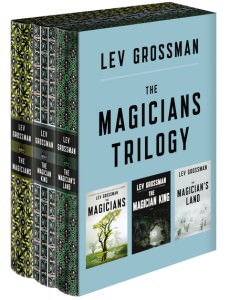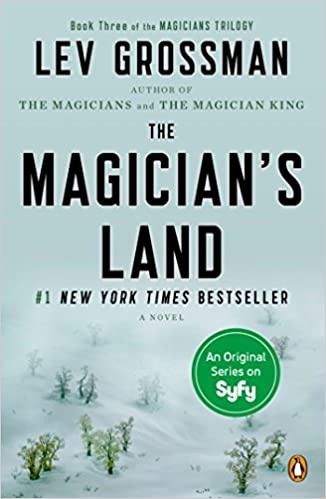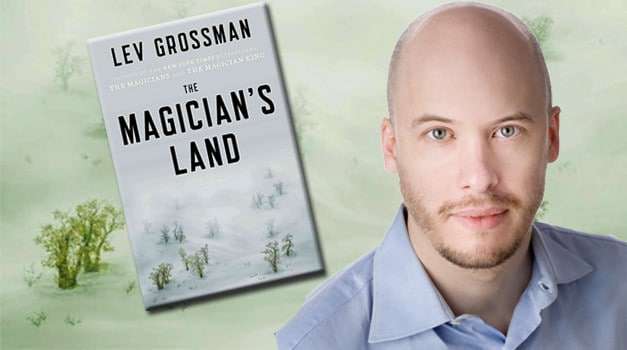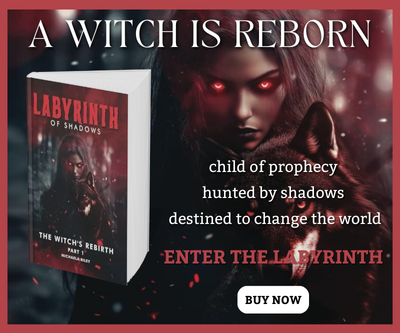The Magician’s Land by Lev Grossman
Lev Grossman’s latest novel, The Magician’s Land, hits shelves this week, marking the triumphant close of his New York Times bestselling fantasy trilogy. The trilogy is no doubt a beacon on the current rising tide in fantasy readership and writership, a genre which Grossman says is evolving quickly.
It’s a suprise to some that Grossman’s novels didn’t follow in his parents’ well-tread literary footsteps (he’s the son of poet Allen Grossman and novelist Judith Grossman), as well as the trajectory of his own academic background. A graduate of both Yale and [giveaway giveaway_id=1605 side=”right”]Harvard, Grossman was surprised by this himself, noting the book Jonathan Strange and Mr. Norrell by Susanna Clarke as one that fueled the start of his trilogy. “[That book] was a fantasy novel that did things I didn’t know fantasy could do,” he said. “It moved me in ways, complicated ways. It was funny and sad and bittersweet in ways that I had associated mostly with literary fiction, and here was this great book about the rivalry between two magicians that was doing things for me that I thought only literary fiction could do.”
It was then that he realized that fantasy novels were more “powerful and sophisticated and important” than he’d realized. His interest in writing fantasy also has been shaped by the work of Neil Gaiman, Kelly Link, and George R.R. Martin, among others. “There’s nothing that [literary fiction] can do that fantasy can’t,” Grossman said. And with The Magician’s Land, he proves that assertion to be correct.
 The Magicians trilogy has been dubbed by some readers “Harry Potter for adults.” In The Magician’s Land, Grossman’s hero, Quentin Coldwater, has grown up. But unlike Harry Potter, Quentin has no Dumbledore to whom he can turn for direction and must figure things out for himself—life, love, magic, and the highs and lows that come with them. Quentin Coldwater struggles with real-life issues, including depression, questions of self-worth, his ability as an apprentice in his trade, and living up to his own potential. It’s in these real-world challenges that The Magicians trilogy does indeed do what literary fiction does—navigate readers through the psychologically important journeys and the emotional nuances of a book’s characters. “The characters are complicated,” Grossman says of the trilogy. “They’re really struggling with some personal issues.”
The Magicians trilogy has been dubbed by some readers “Harry Potter for adults.” In The Magician’s Land, Grossman’s hero, Quentin Coldwater, has grown up. But unlike Harry Potter, Quentin has no Dumbledore to whom he can turn for direction and must figure things out for himself—life, love, magic, and the highs and lows that come with them. Quentin Coldwater struggles with real-life issues, including depression, questions of self-worth, his ability as an apprentice in his trade, and living up to his own potential. It’s in these real-world challenges that The Magicians trilogy does indeed do what literary fiction does—navigate readers through the psychologically important journeys and the emotional nuances of a book’s characters. “The characters are complicated,” Grossman says of the trilogy. “They’re really struggling with some personal issues.”
But they’re also dealing in magic and negotiating a magical land called Fillory, grounding Grossman’s feet firmly in the world of fantasy. While those characteristics of The Magician’s Land lend themselves to crossover fandom among literary and mainstream fiction readers, they also have been grounds for division among some fantasy purists. Grossman, though, says they’re actually evidence of his great love for the genre. “I like to play with fantasy conventions and flip them around,” he admits mischievously. Readers, take note: that’s just what you’ll get in The Magician’s Land, as well as the preceding two installments of the trilogy.
The close of The Magicians trilogy is bittersweet for Grossman. He says that he’ll miss writing Quentin Coldwater, who has struggled with some of the same issues Grossman has faced in his own life. “[Quentin] has my sense of humor. He’s like a good friend. He’s read the same things that I have. He’s struggled with some of the same things that I’ve struggled with. Writing him was a way for me to get involved in working out some problems that I’m having in my life, and I’ve loved watching him gain this sense of power. When I started The Magicians, I was in a very sort of dark place professionally. I was stuck. I felt very powerless. The story of The Magicians in part was Quentin kind of waking up and realizing how much power he has and he’s much stronger than he thought he was. And I love telling that story.”
The New Yorker called Grossman’s trilogy “a darkly cunning story about the power of imagination itself.” Just as Grossman bridges two seemingly divergent genres, fans of both fantasy and literary fiction will find that The Magicians trilogy is a magical experience, and a perfect late-summer binge-read.





Just found out that Lev Grossman is going to be at the Bookmarks 10th annual Festival of Books and Authors in Winston-Salem, NC on Saturday, September 6, 2014! http://bookmarksnc.org/events/festival